 Petzlover
Petzlover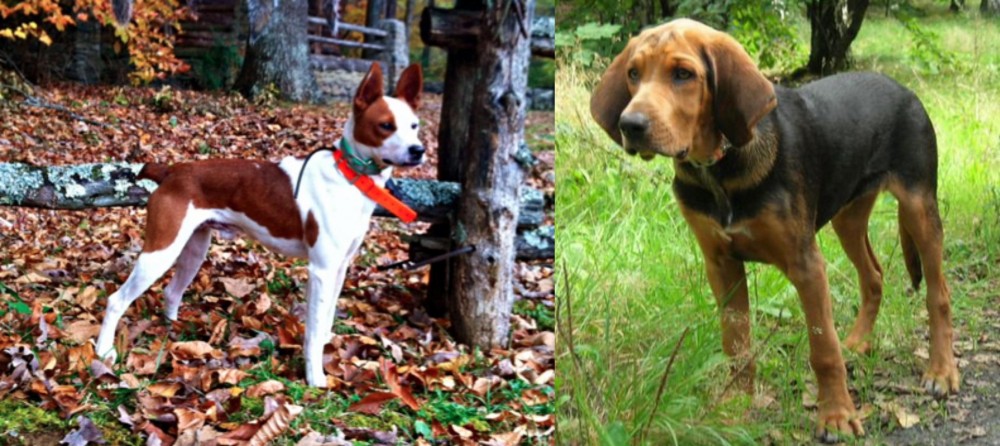 Mountain Feist is originated from United States but Polish Hound is originated from Poland. Mountain Feist may grow 9 cm / 3 inches shorter than Polish Hound. Mountain Feist may weigh 22 kg / 49 pounds more than Polish Hound. Mountain Feist may live 4 years more than Polish Hound. Mountain Feist may have less litter size than Polish Hound. Mountain Feist requires Low Maintenance. But Polish Hound requires Moderate Maintenance
Mountain Feist is originated from United States but Polish Hound is originated from Poland. Mountain Feist may grow 9 cm / 3 inches shorter than Polish Hound. Mountain Feist may weigh 22 kg / 49 pounds more than Polish Hound. Mountain Feist may live 4 years more than Polish Hound. Mountain Feist may have less litter size than Polish Hound. Mountain Feist requires Low Maintenance. But Polish Hound requires Moderate Maintenance
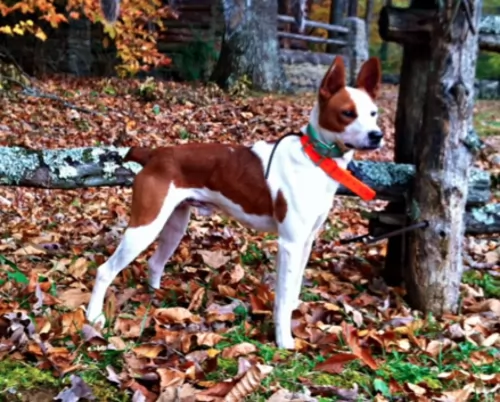 In the Southern portion of North America, the Mountain Feist was developed. It is the Ozarks and Southern Appalachia that the Mountain Fiest calls his ancestral home. The breed dates back centuries and looks very much like a Jack Russell or rat terrier. George Washington, Abraham Lincoln and William Faulkner all featured the breed in their writings. For Washington it was his diary, Lincoln the poem “The Bear Hunt” and Faulkner “Go Down Moses”. These dogs, much like the Curs, were an important part of the early pioneer days in America.
In the Southern portion of North America, the Mountain Feist was developed. It is the Ozarks and Southern Appalachia that the Mountain Fiest calls his ancestral home. The breed dates back centuries and looks very much like a Jack Russell or rat terrier. George Washington, Abraham Lincoln and William Faulkner all featured the breed in their writings. For Washington it was his diary, Lincoln the poem “The Bear Hunt” and Faulkner “Go Down Moses”. These dogs, much like the Curs, were an important part of the early pioneer days in America.
The name Feist means a noisy, small dog in ancient languages. The Feist was developed in the South, the rural areas, in order to hunt and eliminate vermin and small prey animals. The breed was originally a cross between British terriers and hounds from Native Americans. Many others think the feist is not a breed but a type, a working dog which can vary individual to individual.
The Mountain Feist of today has been bred for hunting performance over generations of time. They hunt racoons, squirrel and rabbits among others. They can track even larger game. Other varieties of the feist include the Bench Legged Feist and the Pencil-tail Feist. This is an energetic working dog, curious, intelligent and alert. It is a loud, barky dog that needs to learn a “no bark” command or it may drive you crazy. The breed make good hunting dogs, watch dogs and companions.
The breed was recognized by the United Kennel Club (UKC) in 2015, but not by the AKC or American Kennel Club. Other breed organizations include the National Cur & Feist Breeder’s Association, The National Feist Breeder’s Association, The American Treeing Feist Association, and the Shadowtails Outdoors Group.
 It is thought that Polish Hounds descended from the Kostroma Hound. Other experts believe that the dogs were developed through crossbreeding of Bloodhounds with local Polish hounds.
It is thought that Polish Hounds descended from the Kostroma Hound. Other experts believe that the dogs were developed through crossbreeding of Bloodhounds with local Polish hounds.
The idea was to get a more lighter-boned, more athletic Bloodhound type of dog. In fact, this new standard was adopted in 1983 as the guide for the ideal Polish Hound.
The World Wars caused the numbers of these dogs to be drastically reduced, and attempts were made to revive the breed. The dog is rare outside his native country.
 The Mountain Feist is a medium sized dog with pointy ears that are long and fold over. With their sharp nails that are curved they can climb. Their hind legs are strong to support that activity as well. They have small, dark eyes, a black nose and a muzzle that is medium length and a round skull. The neck is strong, and they have a pretty deep chest. The Mountain Feist tail is bushy, high and erect. There coats come in a variety of colors including blue, black, white, red and brown with the brown being the most common.
The Mountain Feist is a medium sized dog with pointy ears that are long and fold over. With their sharp nails that are curved they can climb. Their hind legs are strong to support that activity as well. They have small, dark eyes, a black nose and a muzzle that is medium length and a round skull. The neck is strong, and they have a pretty deep chest. The Mountain Feist tail is bushy, high and erect. There coats come in a variety of colors including blue, black, white, red and brown with the brown being the most common.
There is a lot of variation of make up and type within the breed itself. Until the last decade or so the breed was fairly isolated among squirrel hunters and there was little cross breeding with other dogs. On the other hand, dogs in the regions where the Mountain Feist was isolated were crossed with them to give them the tree climbing ability, change their size, sharpen their senses or one particular sense and change their appearance.
This is why in different regions you will find Mountain Feist with attributes of the Curs, or the Elkhounds, the Terriers, Spitz or Coonhounds. This accounts for the various types of Mountain Feist Dogs.
 The Polish Hound is a nice, big, solid looking dog. He stands at between 55–65 cm in height and weighs between 20 to 32kg, both male and female. If you were to try and think of him, you could think of a Labrador/Beagle/Bloodhound mix.
The Polish Hound is a nice, big, solid looking dog. He stands at between 55–65 cm in height and weighs between 20 to 32kg, both male and female. If you were to try and think of him, you could think of a Labrador/Beagle/Bloodhound mix.
He is a medium to large sized dog. The coat is short to medium in length and is thick and hard with a soft, dense undercoat. The color of the coat is brown and tan and black and tan. The dog’s tail is set low and is thick and long.
This dog is a wonderful dog known to be clever and eager to please. He also has other attractive characteristics such as being energetic, gentle and he has an urge to protect his human family.
He is also loved because he is reliable and gentle around children who know how to treat dogs with respect. Some people who have owed this dog say that there is just one small fault – the dog’s bark – it is deep and mellow – and its why he isn’t suited to life in the city.
He is a rural dog, loving wide open spaces. It is why the dog will be an excellent pet if he is trained and socialized, becoming obedient and well balanced.
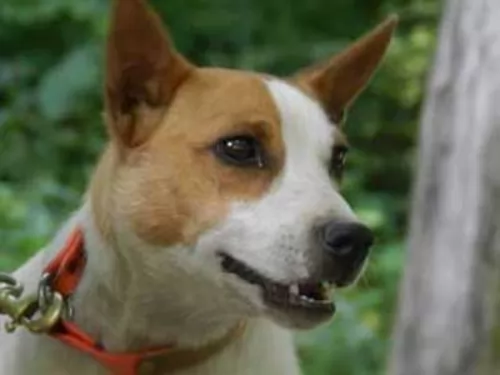 Yes, they very much enjoy playing with children.
Yes, they very much enjoy playing with children.
Tree climbing and stamina.
They need space and land on which to run every day. If you are in an apartment, make sure you have access to a dog park.
They are very intelligent and learn quickly. They love to please but can also be stubborn.
 As a family pet, the Polish Hound just loves his human family, particularly when they are outdoor, active types. Your Polish Hound just loves spending time with his human family.
As a family pet, the Polish Hound just loves his human family, particularly when they are outdoor, active types. Your Polish Hound just loves spending time with his human family.
This is a wonderful dog as a family pet. More so when he has been trained and socialized. In exchange for the the wonderful companionship this dog offers you, you owe it to him to keep him happy and content.
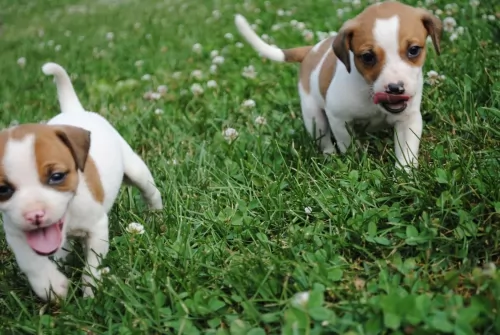 Like most breeds that are isolated, the Mountain Feist does not have a lot of known genetic health issues. They are generally healthy and known to live as many as eighteen years. Perhaps the biggest threat to their lives is the hunting accident, harming joints or paws in hunting situations or being attacked by a larger animal. There are no real genetic threat. Of course, with any dog that has folded ears there is always the possibility of infection or allergies. Keep their ears clean. The other possible concern is hip dysplasia in such an active dog. This can lead to lameness or arthritis. Obesity is another concern that could also lead to hip dysplasia.
Like most breeds that are isolated, the Mountain Feist does not have a lot of known genetic health issues. They are generally healthy and known to live as many as eighteen years. Perhaps the biggest threat to their lives is the hunting accident, harming joints or paws in hunting situations or being attacked by a larger animal. There are no real genetic threat. Of course, with any dog that has folded ears there is always the possibility of infection or allergies. Keep their ears clean. The other possible concern is hip dysplasia in such an active dog. This can lead to lameness or arthritis. Obesity is another concern that could also lead to hip dysplasia.
 The Polish Hound has a reputation for good health. That doesn’t mean you can just leave your pet. Good preventative healthcare is still vital if you want to prevent your pet being attacked by fleas, ticks, worms and mosquitoes.
The Polish Hound has a reputation for good health. That doesn’t mean you can just leave your pet. Good preventative healthcare is still vital if you want to prevent your pet being attacked by fleas, ticks, worms and mosquitoes.
You need to be careful with the Polish Hound because it's a deep chested dog, and these kinds of dogs are more prone to bloat. This is a deadly disease when the stomach twists and gas can’t escape. Untreated, bloat can be a killer. Take immediate action when you see your dog with a swollen stomach, restlessness and drooling.
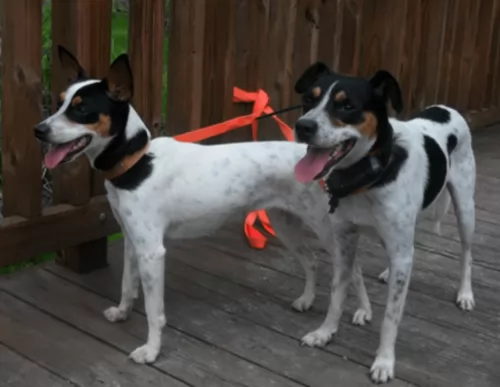 These are very active pups who need a high protein, high quality dry food. Feed a cup to a cup and half broken down into three meals daily. Do not overfeed your puppy.
These are very active pups who need a high protein, high quality dry food. Feed a cup to a cup and half broken down into three meals daily. Do not overfeed your puppy.
Feed the adult about two cups a day broken into two meals. Again, you are looking for a high quality, high protein dry food. Do not overfeed and watch for obesity.
This is a very active breed – a hunting dog with a lot of stamina, strength and energy. They need plenty of exercise as the terrier side of them is just a little hyper. They need at least two walks per day, and they are not great apartment dogs. They need both mental and physical stimulation. This little dog can keep going at a good rate for a long time.
 As a working dog, the Polish Hound is used to being busy and will be relying on you for a good dose of exercise. He loves the chance of a walk or a run and will be happy to run alongside you while you cycle or jog. Don’t forget ball games too.
As a working dog, the Polish Hound is used to being busy and will be relying on you for a good dose of exercise. He loves the chance of a walk or a run and will be happy to run alongside you while you cycle or jog. Don’t forget ball games too.
The thick coat of the dog will need to be brushed twice a week to remove all that loose hairs. He is a moderate shedder so the coat becomes dull if not regularly brushed.
During the brushing session, check your dog over for fleas and ticks, and any odd lumps that weren’t there before. Trim your pets nails if they don’t wear down naturally. This is a floppy eared breed, so you will need to check the inside of his ears for dirt, wax and bacteria.
Pay close attention to your dog’s teeth.Bad teeth can cause a lot of pain but also be very detrimental to your dog’s health.
Just like humans, dogs rely on quality food for good health and longevity. There are many good commercially manufactured dog foods, but avoid the ones with low quality ingredients as these can make your dog ill.
Check the ingredients-list carefully so that you can be sure your pet is getting the right balances of vitamins and minerals. Home-made food is also important as it is nutritious and tasty. You can add it into the dry kibble as a treat sometimes. The simpler the better as dogs don’t like spicy, exotic foods.
Boiled chicken, brown rice or pasta, sweet potatoes, spinach and carrot can be chopped up and given to your pet. Also try and include some raw meat as this is beneficial for health. Fresh, cool water must be made constantly available.